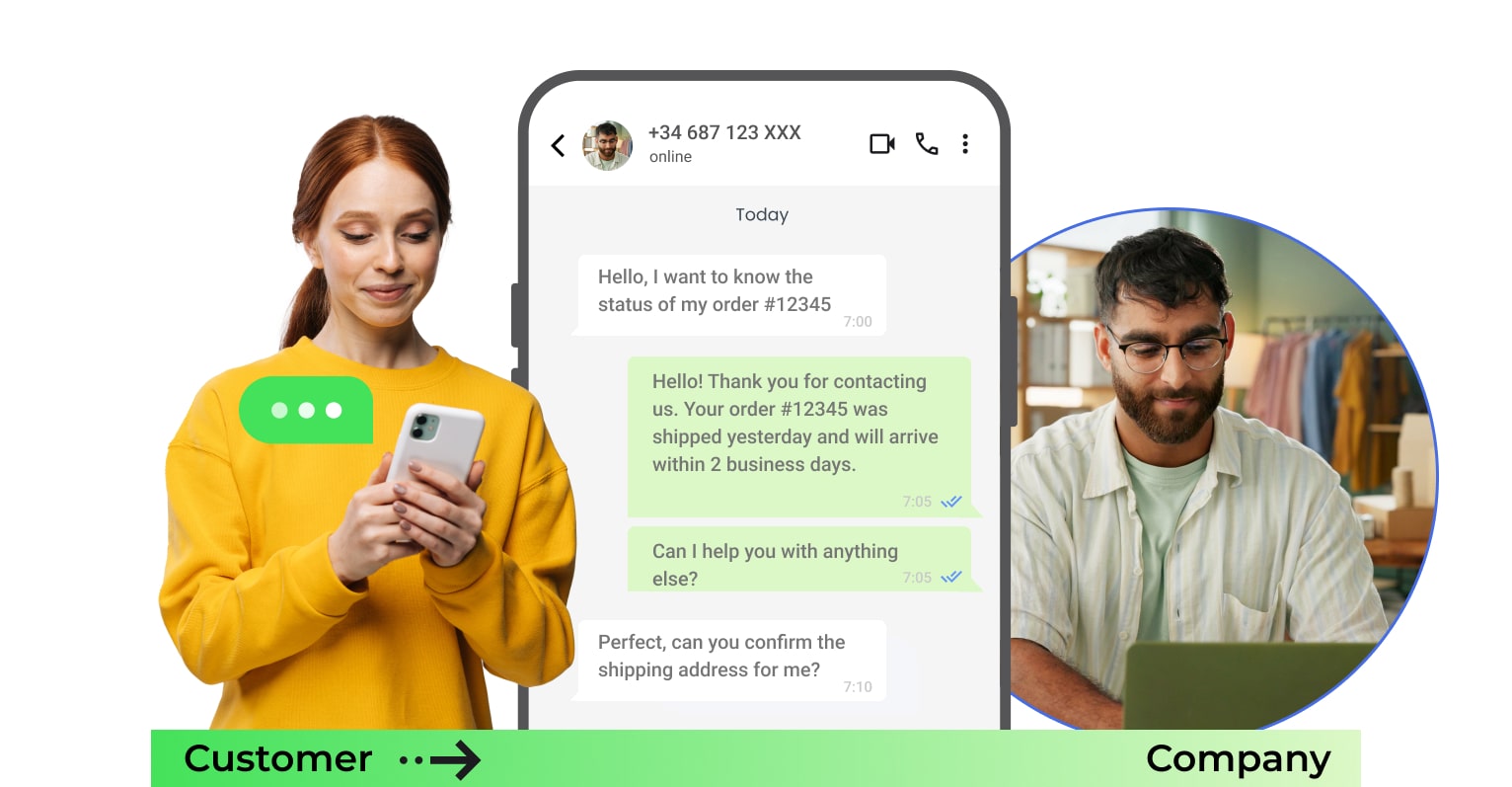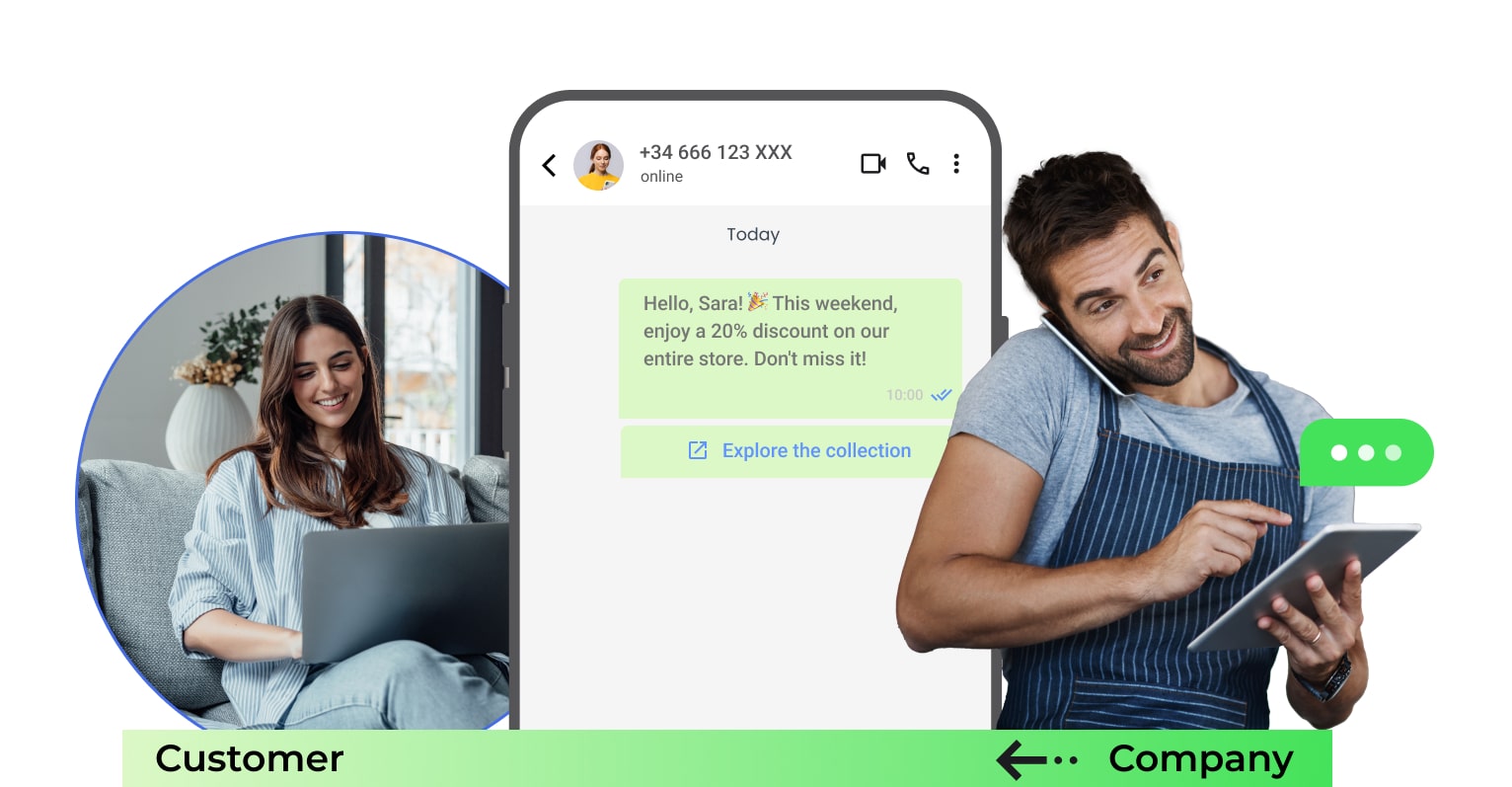With approximately 2 billion active users per month, WhatsApp has established itself as one of the most popular messaging channels worldwide, becoming an essential means of communication.
WhatsApp Business API is the version of this well-known platform designed specifically for businesses. Advanced features, such as automation, integration with CRM and technical support, have made it an essential solution for businesses that manage a high volume of messages and seek to optimize their interaction with customers.
Given its growing importance in the communication strategy of companies, any update to the conditions of use of WhatsApp Business API generates interest and, in some cases, concern. You have probably already heard about the updates to the rates that WhatsApp will implement in 2025. Although these changes may seem confusing at first, don’t worry!
In this article we will explain the new adjustments that Meta will introduce to its rates and how these modifications could impact your business.
WhatsApp Business: Conversation types and categories
WhatsApp Business allows businesses to efficiently manage their interactions with customers through structured conversations. These can be initiated by both the user and the business, making the platform a key tool for optimizing marketing, sales, and customer service processes.
For the new WhatsApp Business API pricing to have a positive impact on your business, it’s key to understand the types of conversations and categories that Meta uses to structure communication. These concepts not only define how interaction is managed, but also how rates are applied:
#1. 24-hour conversation window
Every time a contact sends a message to your business, a 24-hour window, also known as the Customer Service Window, opens. During this period, your business can send messages in both free-form and templated formats. This window resets with each new message from the customer, extending the communication period for an additional 24 hours.
#2. User-Initiated Conversations
Known as Service Conversations, these are triggered when the customer proactively sends the first message.
Important considerations:
- The customer can start a conversation at any time.
- Each message sent by the customer opens a 24-hour window, during which your company can communicate freely.
#3. Business-Initiated Conversations
Meta differentiates between three main types:
Utility Conversations: Designed to inform the customer about order updates, appointment reminders, or shipping information.
Authentication Conversations: Provide additional security, such as identity verification using one-time passwords.
Marketing Conversations: Used for promotions, news, or events, and typically cost more due to their commercial focus.
Important Considerations:
- Your business can only start a conversation using message templates pre-approved by Meta.
- In order to communicate freely within the 24-hour window, your business must wait for a response from the customer.
- If the 24-hour window expires, a new message from the customer or the sending of a template approved by Meta will be necessary to continue the interaction.

WhatsApp Business Billing Model
As we mentioned earlier, WhatsApp categorizes conversations into:
• Marketing: Designed to attract customers and increase sales.
• Utility: Aimed at optimizing processes and offering relevant information.
• Authentication: Designed to reinforce user security.
• Service: Focused on customer service and problem solving.
Currently, WhatsApp Business applies a conversation-based billing model, where a fixed fee is charged for each 24-hour Customer Service Window, depending on the category of the conversation.
One of the key adjustments that Meta will implement in April 2025 is the change from the current model to a per-message pricing system. This adjustment will have a significant impact on how companies manage and budget their interactions on the platform.
If you are interested in learning in detail the implications of this model change and how it could affect your business, continue reading!
WhatsApp Business Pricing in 2025
Meta has announced a series of pricing adjustments that will be rolled out gradually to ease the transition for businesses. These updates seek to align costs with the value that WhatsApp Business brings to business communication.
Changes already in effect
As of November 1, 2024, service conversations are free. This means your business can respond to customers within the 24-hour service window without incurring additional costs, encouraging faster, more personalized service.
International Rates Expansion
Starting February 1, 2025, international rates for authentication messages will apply in seven new markets: Egypt, Malaysia, Nigeria, Pakistan, Saudi Arabia, South Africa, and the United Arab Emirates.
What’s new for April 2025
Starting on 1 April 2025, WhatsApp Business will introduce per-message pricing, replacing the current conversation-based system. The new per-message billing model will be applied as follows:
- Marketing messages: Each template used will have a unit cost.
- Authentication messages: These will be charged per send.
- Utility messages: These will be free within the customer support window, but will be charged per message if sent outside of this free 24-hour period.
Important Notes:
Please note that template prices may vary by region. Check the link for official WhatsApp Business rates for your country.

💡 If you are enjoying this article, don’t miss it “Generating Qualified Leads with WhatsApp: Definitive Guide”
Phased Implementation of the New Pricing Model
Meta has designed a gradual implementation of the new per-message pricing model, structured in two phases to facilitate the adaptation of companies:
Phase 1: Per-message rates will start to apply on April 1, 2025 to companies included in this initial group.
Phase 2: All other companies will move to the new model as of July 1, 2025.
Meta has informed companies about the group to which they belong by email sent on October 10, 2024. If you do not yet know which phase you belong to, check your inbox for this information.
In addition, from April 1, 2025, utility templates sent within the 24-hour customer service window will also be free for companies included in phase 2.
How Changes Will Impact Your Business
The announced changes to WhatsApp Business API rates will have a significant impact on how businesses plan and execute their communication strategy. Below, we’ll discuss the key implications and how they could impact your operations and budgets:
- More controlled budgeting, but with strategic planning: The transition to per-message pricing will allow you to have greater control over costs, as each template sent will have a specific price based on its category. This will force you to optimize their use and prioritize the messages that are really necessary, which could lead to greater operational efficiency.
- Focus on customer experience: With service conversations and useful templates within the customer service window free of charge, businesses will be incentivized to offer faster and more relevant support. This approach could translate into higher customer satisfaction, fostering loyalty and increasing the chances of conversion in future interactions.
- Technology and training investments: To effectively manage message volume and make the most of the new rates, it would be important for your business to invest in advanced automation and CRM integration tools. In addition, it will be crucial to train your teams to manage approved message templates and ensure that each interaction meets business objectives.
- Impact on marketing and sales strategies: The specific categorization of marketing conversations with differentiated rates will require your company to design more specific and high-impact campaigns. Generic or irrelevant messages could generate unnecessary costs without a clear return on investment. This highlights the importance of segmenting audiences and personalizing messages based on customer needs.
- Regional differences: With the expansion of international rates, companies operating in global markets will need to adjust their budgets to take into account cost differences by region. This may require implementing local strategies to optimize the cost/benefit ratio in each country.

Conclusion: Adapt and Ensure the Success of Your Business
The changes to WhatsApp Business API rates are not simply a price update; they represent a challenge that, if managed correctly, can become a strategic advantage for your business. Adopting the new pricing model will allow you to optimize your processes, improve the quality of your customer service, and develop more effective campaigns that maximize return on investment.
The key will be to adapt proactively: invest in technology that automates and facilitates message management, train your team to make the most of the available tools, and constantly analyze your metrics to identify areas for improvement.
Don’t be left behind! With Wask , our WhatsApp marketing automation solution, you will not only be able to adapt, but also stand out in this new business communication landscape.
Contact us! At Webphone we help you prepare your business for a future full of opportunities.
